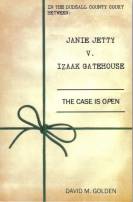 The Case is Open By David M. Golden, Vanguard
Press (Pegasus
Elliot Mackenzie Publishers Ltd.) - 2011
The Case is Open By David M. Golden, Vanguard
Press (Pegasus
Elliot Mackenzie Publishers Ltd.) - 2011ISBN: 978 1 84386 911 5
Brownhills
Local writing and personalities.
If you want to get under the skin of the people of our area, have a look at some of what has been said of the locality and its people.
These stories may come from a few miles outside Brownhills itself but they are close enough to give a flavour of what we are and where we came from.
 The Case is Open By David M. Golden, Vanguard
Press (Pegasus
Elliot Mackenzie Publishers Ltd.) - 2011
The Case is Open By David M. Golden, Vanguard
Press (Pegasus
Elliot Mackenzie Publishers Ltd.) - 2011
ISBN: 978 1 84386 911 5
"A barrister that
is always getting into trouble with the law is totally unheard of...
That is until you meet Izaak Gatehouse; constantly striving to do
well, he finds himself having to dodge being on the wrong side of
the stand on more than one occasion.
A loser in love but a good friend, Gatehouse watches from the
sidelines as his colleague, friend and housemate, Ian Prospect
seduces his way around Birmingham while he pines for the love of
his life, Miss Janie soon to be nee Jetty...Bad luck follows
Izaak as sure as night follows day; when he incinerates a cottage,
is prohibited from practising law in California and wrecks a
ceremony (not to mention a novel ice-cream business) amidst an
ancient stone circle. Determination and desire see Gatehouse
through his trials and tribulations in and out of the court room
which surprises even him. Ultimately, when the going gets tough;
Izaak pulls through (or so he thinks)... "
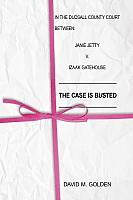 The Case is
Busted By David M. Golden, Eloquent Books, New York,
USA - 2009
The Case is
Busted By David M. Golden, Eloquent Books, New York,
USA - 2009
ISBN: 978-1-60860-036-6 ISBN / SKU: 1-60860-036-X
"David M. Golden brings forth a fountain of
high farce in this intelligently written novel that boasts his
own brand of self-deprecation at its finest--and funniest.
Written with a smidge of Victorian style, Golden amuses and
bemuses his readers with a series of misadventures that resides
somewhere between dark comedy and "wholly inappropriate".
Izaak Gatehouse is a working class male from the industrial
heartland of the UK. Optimistic, accident prone and suffering
from slight OCD tendencies, Izaak is determined to rise above his
station and become an English barrister-at-law.
But bad luck follows Izaak as sure as night follows day when he
incinerates two motor cars, ruins a cocktail party, and destroys
the windshield (not to mention a perfectly good bottle of wine)
of a passing vaporetto. The pursuit of his love interest, an
English Rose named Janie Jetty, creates a comical series of
romantic disappointments that he is quick to recover from .
A riotous comedy that will amuse even the most serious of
solicitors, The Case is Busted is a must for your library
collection."
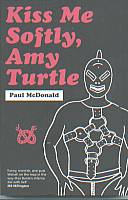 Kiss Me Softly,
Amy Turtle by Paul McDonald, Tindal Street Press,
Birmingham - 2004 - ISBN 0 9541303 7 5
Kiss Me Softly,
Amy Turtle by Paul McDonald, Tindal Street Press,
Birmingham - 2004 - ISBN 0 9541303 7 5
"The will-sapping tedium of life as a Walsall Reflector hack has given Dave ‘Ichabod’ McVane a serious thirst for the devil’s juice. Now, after years of debauchery, the booze has bitten back. Cathetered, bed-bound and with what feels like a rhinoceros buffeting its way through his stomach Dave wakes among ‘regulars’ in a hospital notorious for its high mortality rate. And if his darkest hour wasn’t dark enough, a sinister figure from his student days at the Walsall Academy of New Knowledge reappears...to leave Dave reeling with pain and paranoia as he faces a scalpel-happy surgeon. Join our hero as he embarks on a savage and hilarious ride from S&M to the NHS."
*** A wonderful satirical comedy "who dun it" - but not for the prudish or squeamish. ***
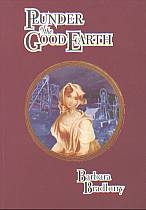 Plunder of the Good Earth
by Barbara Bradbury, The Lichfield Press, WS13 6AA. 2000
Plunder of the Good Earth
by Barbara Bradbury, The Lichfield Press, WS13 6AA. 2000
ISBN 0 905985 19 2
"Barbara
Bradbury was born in Chasetown in Staffordshire, where her family
had settled in the latter half of the nineteenth century. This
novel however is a work of fiction based on her knowledge of the
history and development of the area. She now lives in Harrogate.
North Yorkshire, and is married with a grown-up son and daughter.
Plunder of the Good Earth, is a haunting story of a life lived in
the pit villages of Staffordshire close to the Cathedral City of
Lichfield, with the joys and heartbreaks of an existence which
had few material advantages. Barbara Bradbury has succeeded in
bringing to life characters whose very existence depended on
their harsh environment and whose expectations were pitifully few."
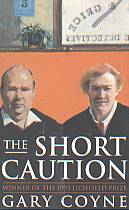 The Short Caution by
Gary Coyne, Orion Books, London. 1994 - ISBN 1 85797 872 2
The Short Caution by
Gary Coyne, Orion Books, London. 1994 - ISBN 1 85797 872 2
Winner of The Lichfield Prize for 1993
"Ex-cops Jack Mayo and Ralph Grice could never quite stick to the rules of the game. Which is why they’re scraping a living as private detectives from a seedy office on the streets of inner Birmingham and wondering where the next job is coming from. Then one day Theresa Johnson turns up at their door - a stripper with a sob story (and a figure) to melt even the hardest of ex-coppers’ hearts - and Jack and Ralph start thinking their luck may be about to change. Theresa’s husband Paul is in the frame for the brutal murder of an aerobics teacher at Lichfield’s Amazon Gym. For a couple of pros like Jack and Ralph, uncovering the real killer should be no problem. But when they do, suddenly the real problem is staying alive."
The story also includes various unpleasant or unsavoury (fictional ! ) activities at Chasewater, Chasetown and Burntwood.
Richard
“Dicky” Dorsett – the town's top class
football hero. The “Brownhills Bomber” was born in
Brownhills on the 3rd December 1919.
1935 – The “Bomber” joined Wolverhampton Wanderers
in April on the ground staff after earlier appearances for
Walsall & District Boys and Birmingham County FA.
1936 – Dorsett signed professional for Wolverhampton
Wanderers in December.
1938 – “Dicky” made his first team debut on 26th
March 1938 against Charlton Athletic.
1939 – The “Brownhills Bomber” scored the only
Wolves goal in the FA Cup final but the team lost to Portsmouth.
1939 to 1945 - the Second World War brought normal football
fixtures to a halt and “Dicky" served in the RAF.
1942 - He was a member of the Wolves side that beat Sunderland in
the 1942 Wartime League Cup final.
1946 – “Dicky” moved across the Midlands to near
neighbour Aston Villa.
1953 - The “Brownhills Bomber” retired from playing to
be Villa youth team coach.
1957 - Dorsett joined Liverpool as assistant-trainer.
1962 – The “Brownhills Bomber” left the top flight
of football and came back to the Midlands.
Find out more about the “Brownhills Bomber” at the Wolverhampton Wanderers web site.
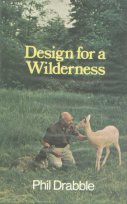 DESIGN
FOR A WILDERNESS by Phil Drabble,
Pelhan Books, London, 1973.
DESIGN
FOR A WILDERNESS by Phil Drabble,
Pelhan Books, London, 1973.
ISBN - 0 7207 0706 4
"Phil Drabble was born in the smoke and grime of the Black Country of Staffordshire and spent twenty-three years on the treadmill of factory life. As a child, he marvelled that any wildlife could survive in the sooty hedgerows and turgid pools left by mining subsidence, and he made friends with the men who poached on local estates. He eventually escaped to a cottage and ninety acres of woodland at Abbots Bromley, six miles from a town and a mile from the nearest main road. Now he spends his time in this Beloved Wilderness, creating a sanctuary for wildlife.
Many of us long to be our own boss and to escape from the rat-race into the heart of the countryside. Phil Drabble put this idea into practice and described in My Beloved Wilderness how he got away from industry, after over twenty years, to create a wildlife sanctuary in his own woodland far from the beaten track. His experiences suggested that it might be possible, not only to attract a wide variety of wildlife but to make the experiment pay for itself. He is far more interested in birds than in bird-watchers, so the last thing he wanted to do was to destroy the peace of his sanctuary by turning it into a glorified wildlife park.
He tells the story of this experiment in Design For A Wilderness. His techniques are controversial because he works on the theory that nature conservation is as old as gamekeeping - and that some of his keeper and poacher friends have forgotten more about wild creatures than the blue stocking boffins will ever know. Conservationists may get ideas for reserves which do not have to rely on charity and sportsmen may help threatened species at the same time as they are increasing their potential bag. In putting the design for his wilderness into practice, the author not only tastes the delights of escape from modern pressures but the even greater satisfaction of leading a creative as well as a simple life."
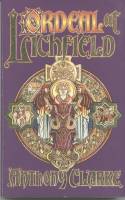 Ordeal in Lichfield by Anthony
Clarke, Hodder & Stoughton, London 1998
Ordeal in Lichfield by Anthony
Clarke, Hodder & Stoughton, London 1998
ISBN - 0 340 71254 6
Winner of The Lichfield Prize for 1997, this novel is set in the Mercia of AD675. Britons and Saxons are involved in nationalist and religious strife in and around Lichfield Cathederal.
"an enthralling voyage into Britain's past"
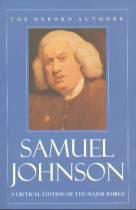 The Oxford
Authors Samuel Johnson edited by Donald Green, Oxford
University Press
The Oxford
Authors Samuel Johnson edited by Donald Green, Oxford
University Press
1984 - ISBN 0 19 281340 4
Samuel Johnson was born on the 7th September 1709 at the family home and bookshop in Breadmarket Street, Lichfield (what is now the Samuel Johnson Birthplace Museum). Better known as Doctor Johnson - the 18th century’s greatest man of letters and creator of the first great dictionary of the English language. Johnson died on 13th December 1784 and is buried in Westminster Abbey.
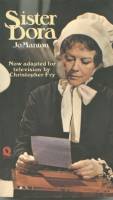 Sister Dora - The
Life of Dorothy Pattison by Jo Manton, Methuen, London
1971 and Quartet Books, London 1977. ISBN 0 7043 3161 6
Sister Dora - The
Life of Dorothy Pattison by Jo Manton, Methuen, London
1971 and Quartet Books, London 1977. ISBN 0 7043 3161 6
'What Florence Nightingale did for military hospitals, Dorothy Pattison accomplished in civilian duty' wrote the Daily Telegraph in 1897. This is the first full biography of a remarkable woman; beautiful, sensitive, with a strong sense of humour, Dorothy Pattison endured thirty years of claustrophobic family life bound by duty and financial constraint to an insane father and a submissive mother.
She joined a pioneer Anglican sisterhood which sent her to nurse (a lifelong ambition previously thwarted by her father) in the heart of the Black Country where epidemic and accident were the daily accompaniment to poverty, urban squalor and dangerous working conditions. For fourteen years, until her premature death, she cared for the poor, setting new standards for the nursing profession and bringing about social improvements on a scale of which she could not have dreamed.
Jo Manton's highly acclaimed biography was adapted for television starring Dorothy Tutin as Sister Dora, presenting her amazing, pioneering life to a wider audience.
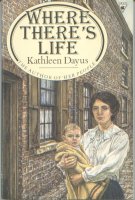 Her People / Where There's Life / All
My Days / The Best of Times / The Ghosts of Yesteryear by
Kathleen Dayus, Virago, London
Her People / Where There's Life / All
My Days / The Best of Times / The Ghosts of Yesteryear by
Kathleen Dayus, Virago, London
ISBN 0-86068-275-7 / 0-86068-623-X / ? / ? / 1-86049-808-6
"There are, without doubt, some remarkable people in this world, and local writer and historian Kathleen Dayus is definitely one of them. 97 years old (in the year 2000) and still writing. An inspiring lady, there are few people left who have lived through so much of Birmingham’s industrial history and able to tell its story first hand with such eloquence and realism. Dayus was born in Hockley in 1903, her childhood being spent in the slums of the JewelIery Quarter: The appalling poverty, inadequate food and cramped living conditions of the densely populated courts built to house Birmingham’s working poor. Her writing provides a unique insight into industrial slum life as she worked and raised a family in the most dreadful conditions. The indomitable spirit, humour and sheer verve that characterise her life shine out from her books."
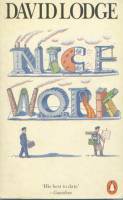 Nice Work by
David Lodge, Seker & Warburg 1988 and Penguin, London.
Nice Work by
David Lodge, Seker & Warburg 1988 and Penguin, London.
ISBN - 0 14 011920 5
1989Winner of the Sunday Express Book of the Year Award and shortlisted for the Booker Prize.
"The campus novel meets the industrial novel... Lodge charts an improlŗble but highly entertaining relationship between Vic Wilcox (MD of Pringle's engineering firm) and Dr Robyn Penrose (temporary Lecturer in English, and fully paid-up devotee of semiotic materialism)... The result is compulsive reading" - David Profumo in the Daily Telegraph
'As a comedy of society and class misunderstandings, Lodge has never observed more sharply... A very nice work indeed' - Andrew Sinclair in The Times.
Set in the city of "Rummidge", there is a strong flavour of the Black Country and Birmingham ( or Brummegam, as the locals know it) !
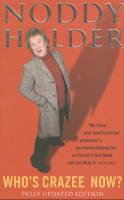 Who's Crazee Now?-
My Autobiography by Noddy Holder (with Lisa Verrico)
Elbury Press, Randomhouse, London
Who's Crazee Now?-
My Autobiography by Noddy Holder (with Lisa Verrico)
Elbury Press, Randomhouse, London
ISBN 0 09 187503 X
As the front man of the Glam Rock band Slade, this Walsall boy gave the world the Black Country accent wrapped around a pile of number one hits. His story covers his working class begginings around Walsall and Wolverhampton, world wide music fame and his later work as TV and radio presenter.
The story of "The Grimleys" TV comedy drama ( set in a 70's Black Country comprehensive school) shows Noddy in his other life as a actor.
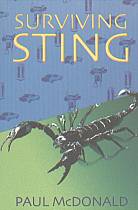 Surviving Sting
by Paul McDonald, Tindal Street Press, Birmingham - 2001 -
ISBN 0 9535895 4 4
Surviving Sting
by Paul McDonald, Tindal Street Press, Birmingham - 2001 -
ISBN 0 9535895 4 4
‘Ace Face’ wannabe Dave ‘Mac’ McVane thinks he’s got it made. Luscious Joolz, the most shaggable girl in Walsall, invites him to her home on the notorious Jerome K. Jerome estate. But will the woman of his dreams and a ‘real’ saddlemaker’s job in the Happy Stallion make Mac the man he wants to be? Take a cast list that includes demented Billy-Bob and his twizzler parents, the sociopathic Tezza, a boy named Sue, and Brainy Key, red-wine drinker and swot. Add a pet scorpion and an overdressed Yorkshire terrier to this Black Country brew, vintage 1979, and a pacy comic nightmare takes over. A crazy week of sex, violence and betrayal gives a hilarious twist of realism to this intelligent evocation of growing up in ‘the ugliest town in the country’. Oh, and someone gets a duffel-coat toggle rammed up his nose.
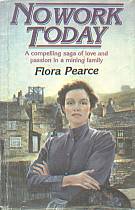 No Work
Today by Flora Pearce, Futura Publications, London
1987 - ISBN 0 356 15298 7
No Work
Today by Flora Pearce, Futura Publications, London
1987 - ISBN 0 356 15298 7
"Set in a Midlands mining village in 1908, where work is
scarce and hardship a way of life, NO WORK TODAY is the moving
portrait of one family and the love and loyalty that sustains it.
Mary Ann, courageous and spirited, single-≠handedly provides for
her children when deserted by her selfish and philandering
husband, Raish.
Katy, her vivacious and captivating daughter, seeks financial
security in marriage. But she can never forget the handsome,
charming man who first loved her.
Paul, hardworking and ambitious, dreams of mine-ownership and
prosperity. But too late he learns the high cost of success...
And Ben. A fighter for miners’ rights, hot≠headed and
impetuous, he covets his brother’s wife.
Above all of them hangs the shadow of their drunken and
domineering father - the man they all have reason to hate
and the man their adored mother has never stopped loving….."
Set in HeathEnd - between Pelsall, Rushall and Shelfield.
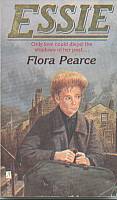 Essie
by Flora Pearce, Futura Publications, London 1988 - ISBN 0
7088 4049 3
Essie
by Flora Pearce, Futura Publications, London 1988 - ISBN 0
7088 4049 3
New Year’s Day 1913 and Essie sets out for Walsall and a job as kitchen maid. Just thirteen years old, she leaves her impoverished family and the Midlands mining village that has been her home without a backward glance.
Set in HeathEnd - between Pelsall, Rushall and Shelfield - and also Walsall, Cannock Chase and Dorset.
John Petty sometimes known as Jack Petty. Born
1919 in Walsall , died in Dawley in 1973 aged 54.
Five Fags A Day Published by Martin Secker &
Warburg, London, 1956 - also reprinted in 1982 by Remploy,
Leicester for Walsall Public Librarys.
A Flame In My Heart Published by Secker &
Warburg, London, 1958.
The Last Refuge Published by Ronald Whiting & Wheaton,
1966.
The Face – an autobiography Published by Gentry
Books, London, 1972.
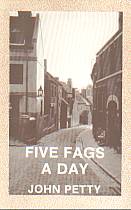 Five
Fags A Day by John Petty. Published by Secker &
Warburg. London. 1956. Was also reprinted for Walsall Public
Librarys. ISBN 07066-0919-0
Five
Fags A Day by John Petty. Published by Secker &
Warburg. London. 1956. Was also reprinted for Walsall Public
Librarys. ISBN 07066-0919-0
John Petty sometimes known as Jack Petty. Born 1919 in Walsall , died in Dawley in 1973 aged 54.
John Petty wrote about the Black Country.
He was one of those men who, given the choice, would not have
asked to be born. He became a writer because it gave him a
temporary way out of the torment he lived in day after day. He
had his brief spell of fame, but never any fortune, and he passed
on. His masterpiece was the book 'Five Fags A Day'. It saw the
light of day in 1956, but then it faded gently into obscurity, as
did Mr Petty.
To understand 'Five Fags A Day', you have to go back to the years
following the last war. You have to be riding on a train through
the Black Country. You have to be looking through the carriage
window. Alongside the railway line will be slag heaps and rubbish
dumps. There you will see the people John Petty writes about.
People tatting on the tip. Hard work in an effort to collect
enough scrap metal to earn a few pounds. Men and women, backs
bent, and scraping at the rubbish with a hook or a fork.
Working on the tips gave John his independence, the fresh air
helped his cough, it gave him a little money, and it gave him
time to think - to think about becoming a writer. It also gave
him the time to meet Kathy. How incongruous it seems, a sick man,
and scruffy schoolgirl, becoming friends on the side of a filthy
tip. In 'Five Fags A Day', John Petty tells the story of his own
troubles as a tatter, but also writes about the rise of a young
woman. He is in love with her, and she with him, but he has to
tell her that she cannot stay as his girl, he will only hold her
back in her quest to find a better life. Kathy eventually leaves,
and John does not meet her again. He is a sad and a broken man.
His cough is worse and he fears he is dying, and perhaps he is.
It comes to everyone at some time in their lives. John Petty did
not live long enough to become famous, or a world wide name, but
his book lives on, and with it the story of the tatter on the tip
and the love of his life. --- Extracted from a review by
Delphine Temples at Midland-Gold.
John Petty was born in about 1919 and lived
in Kent Street, Walsall for many years. By the time he left
school at 14, his considerable literary talent had already been
recognised by his English teacher. Petty drifted through many
jobs before joining the army at the age of 17 - he later deserted
and was imprisoned for a time. In 1939 he rejoined the army, only
to be discharged upon medical grounds, twelve months later. Poor
health was to blight the rest of his life. The years spent
gleaning scrap from local rubbish tips could only have aggravated
his tuberculosis. It was during this period that Petty became
determined to succeed as a writer, using his own experiences as
inspiration.
Before Five Fags A Day’ was published in 1956 he had
suffered many setbacks and had several works rejected. This book,
his first success, sold only 1,400 copies and his royalties
amounted to only £80. However, Petty seems to have met his wife,
Ethel, as a result of ‘Five Fags A Day’ and the couple
married shortly after it was published.
In 1958, ‘Flame In My Heart’ was published. ‘The
Last Refuge followed in 1966. Petty also wrote a number of
newspaper articles during this period. In 1967, he was awarded an
Arts Council bursary, which he used to purchase a cottage in
lronbridge, but within months the property was condemned. The
local council eventually provided him with a little cottage in
Dawley.
By now Petty was a well known personality but he received no
recognition of his literary status from his hometown.
Understandably, Petty resented this -in fact he disowned Walsall
on the dust cover of his autobiographical work, ‘The
Face’, claiming that he came from the Potteries. ‘The
Face’, published in 1972, was Petty’s last work, for he
died in Dawley in 1973 aged only 54. ---- by Joyce Hammond,
from the re-issued book
Five fags a day is rightly regarded as John
Petty’s best work. Set in the post-war Black Country, it
tells of his hardship, earning a meagre living as a scrap-picker
off a slag heap near Walsall. John Petty’s fight to survive
harsh poverty depicts a grim existence and recreates a Black
Country of almost unbelievable harshness.
Despite the mud and grime of the rubbish dumps, Petty presents a
picture of rare humanity, bringing to life, with great humour and
compassion, his friends and fellow rejects of society. In the
telling of his story there abound wonderful descriptions of
characters like Big Carl, the ‘Godfather’ of the slag
heaps. Above all it is the story of Petty’s friendship with
the child-woman Kathie, and romance flowers among the rubbish
heaps and scrap metal.
John Petty’s portrait of the Black Country of 1949 compares
with descriptions in George Orwell’s ‘Road to Wigan
Pier’, a book which epitomised the poverty of the thirties.
As Angus Wilson says in his introduction, ‘I do not find it
easy to forget many of the passages in this book’, an
opinion which will be shared by those who read this challenging
literary work.
After being virtually unobtainable, even on the second-hand
market, for over twenty years, it is hoped that with this
re≠publication a new readership will discover the dark realities
of the world of John Petty, a discovery which will help to
achieve, posthumously, an even greater recognition, which has
been long overdue, particulary in the Black Country.
The last word is left with Angus Wilson, ‘This book makes
cruel reading and it should be so.’
by David Massey, from the re-issued book.
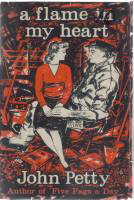 A Flame
In My Heart by John Petty. First published by Secker
& Warburg, 1958.
A Flame
In My Heart by John Petty. First published by Secker
& Warburg, 1958.
"George Binden has through twenty years of hard and honest toil, earned the reputation of the best liked and respected worker in the brass foundry in the Midlands where he is employed. At 38, a giant of a man, his life seems to run smoothly. But he is assailed by a secret dread and an equally secret passion. His work in the foundry is rotting his lungs, and he is sexually violently attracted by the eldest of his four daughters. Mr. Petty tells, in prose that is both evocative and moving, of the tragedy that overtakes this simple, bewildered, almost pagan man. It is the strength of this unusual, uncompromising novel that the author portrays a working-class family and its background without a trace of condescension, compassion or sentimentality. Freed from these handicaps he has the power utterly to convince. He can convey the very feel and smell of the foundry, the all-pervading drabness of the landscape; and his characters, primitive in their uncomplicated emotions, always close in their lives to the uglier aspects of nature, ring absolutely true. Mr. Petty is a young writer, and his novel bears traces of this fact, yet already he may claim to be following in the footsteps of such as Dostoievsky and D. H. Lawrence. A Flame in My Heart deals in violence - spiritual and physical - in passion and in disaster. It contains also, in its hero, a character as magnificently realised as any in recent fiction."
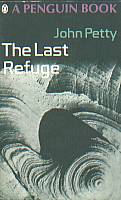 The Last Refuge
by John Petty. First published by Ronald
Whiting & Wheaton, 1966.
The Last Refuge
by John Petty. First published by Ronald
Whiting & Wheaton, 1966.
"James Muller is a relic — and a danger to the state.
For he was once a writer. And people remember...
Even people drugged by the calculated sensualities that keep the peace in despotic, post-H-bomb Britain ... the naked, state-employed streetwalkers, the bugged bedrooms, the subtly staged depravities...
And because he is a danger, he is given the most terrible punishment the new scientific society can impose — freedom.
This is X-certificate SF, by an excitingly new and original talent."
A novel that is part "1984" and part "Brave New World" with hints of Walsall and the Midlands.
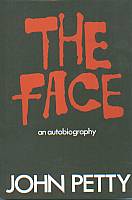 The Face –
an autobiography by John Petty. Published by Gentry
Books. London, 1972.
The Face –
an autobiography by John Petty. Published by Gentry
Books. London, 1972.
"You are afraid.
Do you know of what you are afraid? Afraid of the face of a dream? Of the face of reality?
John Clare wrote 'I long for scenes where man has never trod.’ This was his testament, his expressed longing for release. But release from what?
In this intensely human, haunting and often humourous autobiographic tale, John Petty contends that most men want nothing very much from life—beyond the obvious material things; that to know and have these things, they will shutter their eyes against ... The Face.
This is a cry or the weak, the afflicted, the over-perceptive, for the sane who are not insane, for the forgotten children, for the lost. For, in the last analysis, the brave...."
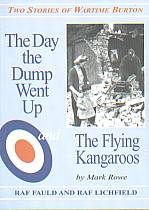 THE DAY
THE DUMP WENT UP and THE FLYING KANGAROOS by Mark Rowe,
1999
THE DAY
THE DUMP WENT UP and THE FLYING KANGAROOS by Mark Rowe,
1999
published by Mark Rowe - ISBN 0 953 1232 0 1
On November 27, 1944, the underground bomb store at RAF Fauld, near Burton, exploded. Seventy were killed or missing in the biggest man-made explosion ever in Britain. Mark Rowe tells the story in the words of those that lived through it: survivors, rescuers, families of the victims, and ordinary Burton people who will always remember THE DAY THE DUMP WENT UP.
The former aerodrome beside the A38 at Fradley is at peace today. But in the Second World War it teemed with life as RAF Lichfield - a training airfield for Australians learning to fly bombers against Nazi Germany. Some fliers were killed in flying accidents and remain forever at Fradley; the surviving men went home eventually to Australia. More than 50 years later, those RAAF veterans recalled wartime Staffordshire - winter cold, warm pubs, and the danger of sudden death. In retelling these stories, otherwise soon lost for good, Mark Rowe reveals also something of what it meant to him to meet THE FLYING KANGAROOS.
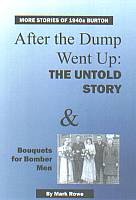 AFTER THE DUMP WENT UP: The Untold Story and BOUQUETS
FOR BOMBER MEN by Mark Rowe, 2000
AFTER THE DUMP WENT UP: The Untold Story and BOUQUETS
FOR BOMBER MEN by Mark Rowe, 2000
published by Mark Rowe - ISBN 0 953 1232 0 2
More about RAF Fauld and wartime stories from RAF Church Broughton.
 Frank
Skinner by Frank Skinner, Century, London 2001 - ISBN
0 7126 79278
Frank
Skinner by Frank Skinner, Century, London 2001 - ISBN
0 7126 79278
"Frank Skinner is one of the funniest and most successful British comedians to have emerged in recent years.
Born Chris Collins on 28th January 1957 he grew up in the West Midlands where he inherited his father’s passion for football. He attended his first West Bromwich Albion game at the age of ten and immediately became a life-long supporter. Having been expelled from school at sixteen, Frank held down a variety of dead-end jobs until he decided to revive his education by going back to the classroom and eventually gaining two degrees in English Literature. Nurturing a serious alcohol problem from the age of fourteen, Frank renewed his faith in Catholicism in 1987. He hasn’t had a drink since.
Frank performed his first stand up gig in December 1987 and, only four years later, went on to win the prestigious Perrier Award at the Edinburgh Festival. His first television appearance in 1988 met with fits of laughter from the studio audience and 131 complaints from the viewers, including one from cabinet minister Edwina Currie. He met fellow comedian David Baddiel in 1990 and the two went on to create the hit TV series Fantasy Football League picking up a triple number one hit with the World Cup Anthem Three Lions (It’s Coming Home).
Frank’s unique blend of laddish and philosophical humour has earned a prime time slot on ITV for The Frank Skinner Show, which has been watched by up to ten million viewers per week.
Here, for the first time, Frank candidly tells us of the highs and lows of his fascinating life and career."
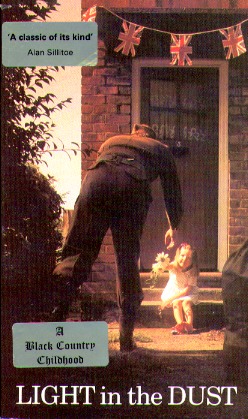 Light in the Dust
(An Autobiography 1939-1960) by Jo Mary Stafford tells the story
of a Walsall girl and her upbringing in a poor home of a father
"at war" with his family. Jo Mary writes in her
introduction - "This is a story of the survival of the human
spirit in the face of parental oppression and social and economic
deprivation. It points to a greater need for compassionate
understanding in a society often deaf and blind to the mental
scarring of the growing child, and, by definition, of the adult."
Light in the Dust
(An Autobiography 1939-1960) by Jo Mary Stafford tells the story
of a Walsall girl and her upbringing in a poor home of a father
"at war" with his family. Jo Mary writes in her
introduction - "This is a story of the survival of the human
spirit in the face of parental oppression and social and economic
deprivation. It points to a greater need for compassionate
understanding in a society often deaf and blind to the mental
scarring of the growing child, and, by definition, of the adult."
Published by Trustline Publishing, Stourbridge, England 1990. ISBN 0 9516438 0 0
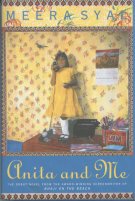 Anita
and Me by Meera Syal, Flamingo, HarperCollins, London
1996. ISBN 0 00 225340 2
Anita
and Me by Meera Syal, Flamingo, HarperCollins, London
1996. ISBN 0 00 225340 2
"Anita and Me is a unique vision of a British/Indian childhood in the Midlands of the Sixties, a childhood caught between two cultures, each on the brink of enormous change. Like every nine-year-old girl, Meena can't wait to grow up and break free from her parents. But, as the daughter of the only Punjabi family in the mining village of Tollington, her fight for independence is different from most. Meena wants fish-fingers and chips, not just chapati and dhal; she wants an English Christmas, not the interminable Punjabi festivities she has to attend with her embarrassing Aunties and dreadful cousins, Pinky and Baby - but more than anything, more than mini-skirts, make-up and the freedom to watch Opportunity Knocks, Meena wants to roam the backyards of working-class Tollington with the feisty Anita Rutter and her gang. With great warmth and brilliantly observed dialogue, Meera Syal creates a superb cast of characters, from the wise and devious old Nanima to the curious Mr. Worrall, stranded in his front room since the war."
In 2002 the story is being made into a major film, with Meera Syal in one of the leading roles.
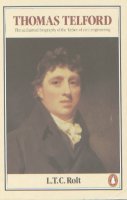 Thomas Telford by
L.T.C.Rolt, Longmans, 1958 & Penguin,1979. ISBN 0 14
008125 9
Thomas Telford by
L.T.C.Rolt, Longmans, 1958 & Penguin,1979. ISBN 0 14
008125 9
Bridge-builder extraordinary, 'the colossus of roads', founder of the school of engineers, unsurpassed engineer-architect.
The son of a shepherd from the Scottish borders, Thomas Telford rose to be one of the greatest engineers Britain has ever seen. His bridges, aqueducts, roads and canals combined aesthetic grace with brilliant engineering. His life spanned one of the most dynamic periods in British history, the decades of the industrial revolution, and no one contributed more to making Britain the 'workshop of the world'.
As part of the London to Holyhead route, Telford was responsible for bringing back to life the long derelict Roman Watling Street through Brownhills in the early part of the 19th century . This caused Brownhills to become writ large on the road maps of the nation due to the junction of the Watling Street and the Chester Road.
V1.12 - 13 May 2013 ---- recommended resolution (1366 x 768)
© David Hodgkinson 2000-2013. All rights reserved.